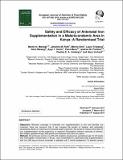Safety and efficacy of antenatal iron supplementation in a malaria-endemic area in Kenya: A randomised trial

View/
Publication Date
2015-08-14Author
Martin N Mwangi, Johanna M Roth, Menno Smit, Laura Trijsburg, Alice Mwangi, Ayşe Y Demir, Petra Mens, Andrew M Prentice, Pauline EA Andang’o, Hans Verhoef
Metadata
Show full item recordAbstract/
Objectives: Whereas coverage of antenatal iron supplementation is low and benefits are uncertain, there are concerns that it can increase the burden of malaria, with potentially devastating effects on maternal and neonatal health outcomes. We aimed to measure the effect of iron supplementation during pregnancy on maternal Plasmodium infection assessed at delivery, birth weight, gestational age, fetal growth and maternal and infant iron status. Methods: Rural Kenyan women (n=470) with singleton pregnancies, gestational age 13─23 weeks and haemoglobin concentration ≥ 90 g/L were randomised to supervised daily supplementation with iron (60 mg as ferrous fumarate) or placebo until 1 month postpartum. To prevent severe anaemia, all women additionally received 5.7 mg iron/day through flour fortification. Intermittent preventive treatment against malaria was given as usual.Plasmodium infection was assessed at birth by dipstick tests, PCR and histological examination of placental biopsies. Results: There was no evident effect on Plasmodium infection (both intervention groups: 45%; difference, 95% CI: 0%, ─9% to 9%). Iron supplementation increased birth weight by 143g (95% CI: 58─228g) and reduced the prevalence of low birth weight (<2,500g) by 65% (95% CI: 13%─86%). The effect on birth weight was larger in women who were initially iron-deficient than in those who were iron-replete (250 g versus ─13 g; p-interaction=0.008), and the improved birth weight seemed achieved mostly through improved fetal growth. Iron supplementation resulted in improved maternal iron status at 1 month postpartum, and improved infant iron stores. Conclusions: Coverage of universal antenatal iron supplementation must be increased.
